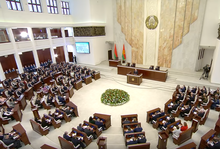House_of_Representatives_of_Belarus
House of Representatives (Belarus)
Lower house of the National Assembly of Belarus
The House of Representatives of the National Assembly of the Republic of Belarus[n 2] is the lower house of the parliament of Belarus, while the upper house is the Council of the Republic. It was established after the Constitution of Belarus was amended in 1996, replacing the Supreme Council of Belarus.[1]
It consists of 110 deputies elected to four year terms on the basis of direct electoral suffrage by secret ballot (art. 91).[2] It is a majoritarian system, with the outcome decided by overall majorities in single-member constituencies. Any citizen of 21 years is eligible for election (art. 92). The functions of the House are to consider draft laws and the other business of government; it must approve the nomination of a prime minister (art. 97); and it may deliver a vote of no confidence on the government (art. 97).
Since the 1995 Belarusian parliamentary election the majority of seats in the House of Representatives have been held by independents.



